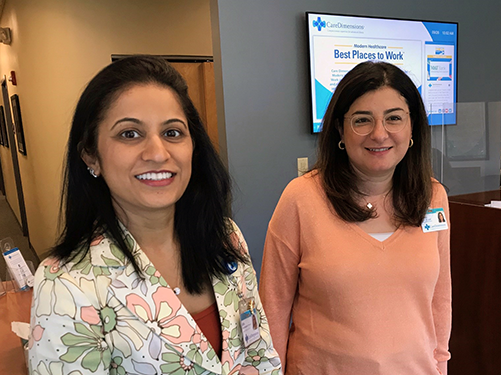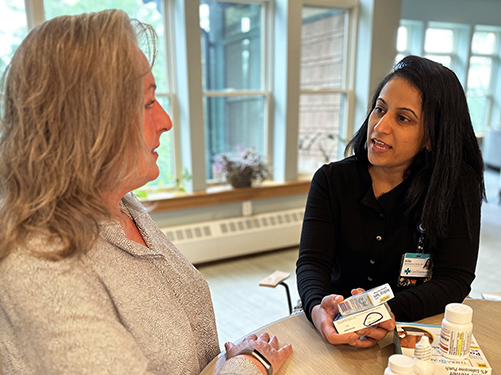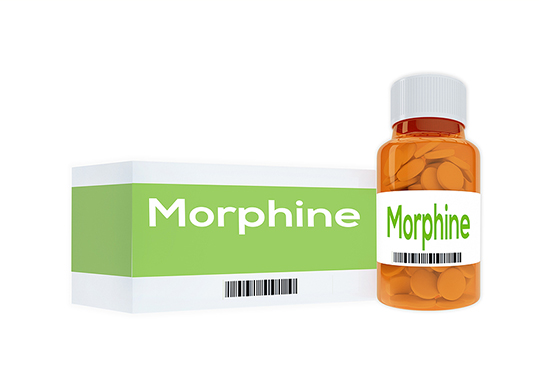How can we help?
888-283-1722
Call us now at 888-283-1722
24/7 Referrals and Nursing Support
Voices of Care Blog

4 Alternative Ways of Taking Medication
Posted on October 5, 2022 by Nancy Messih, RPhPeople with serious illness often take multiple medications to manage their symptoms. The traditional way of taking these medications is by mouth, but what if the patient has difficulty swallowing, or can’t swallow at all?
People who have trouble swallowing still may be able to take their medication by mouth if tablets can be crushed or split, or if capsules can be opened and sprinkled on food.
Some medications are available in liquid form as well, but sometimes the amount is too much for the patient to swallow.
The oral route (by mouth) may be the most convenient and cost-effective way to take medication, but there are other methods just as important and sometimes even more effective. Here are four alternative ways of delivering medication to the patient while they remain at home.
1. Under the tongue (sublingual)
Did you know that a drug placed under the tongue starts working faster than when swallowed?
Some liquid medications can be placed under the tongue and some tablets can be placed under the tongue to dissolve; medications start working faster as they are absorbed by the blood vessels under the tongue and directly deposited into the blood.
This alternative method of taking a medication is often used for pain, anxiety, and agitation.
2. Rectal
Did you know that medications taken by the rectal route act faster than via the oral route?
When you take a medication rectally, it is absorbed by the blood vessels in the rectum and flows directly into the circulatory system, which quickly distributes the drug to the body's organs and bodily systems. In addition to being more effective than the oral route, rectal administration reduces some drugs’ side effects, such as gastric irritation, nausea, and vomiting.
Suppositories are an effective method of delivering medication, especially in cases of seizure, constipation, nausea, and vomiting.
Your doctor might recommend a rectal catheter, which is placed by the nurse and through which most medications – including crushed tablets and liquids – can be administered. You do not need to disturb or reposition the patient to administer medications this way.
3. Inhalation
Did you know that it is much easier and more effective to use a nebulizer than an inhaler?
A nebulizer is a machine that changes medication from a liquid to a mist so you can inhale it into your lungs. Nebulizers are an effective and easy alternative to inhalers for delivering medications that help with shortness of breath. All the patient needs do is breathe normally while wearing a mask to inhale the medication. There is less room for error with a nebulizer because various inhalers have different techniques and might not be a good choice for patients who are frail or have difficulty using an inhaler.
4. Intranasal
Did you know that medications taken as a nasal spray can have a systemic effect, not just a local effect?
Drugs administered through the nose are absorbed quickly through the thin membrane that lines the nasal passage and enter fast into the blood stream. This option may be used with medications for sedation or controlling seizures, or severe pain.
The pharmacist is a vital member of your hospice care team
Care Dimensions is one of the only hospices in the region that has full-time, employed pharmacists as part of the hospice care team. Pharmacists work with the hospice physician to make recommendations around managing potential medication interactions, evaluating medications based on side effects and safety information, and recommending dosage conversions to forms of medications that allow for effective pain and symptom management to improve patient comfort and quality of life.
As a hospice pharmacist, I educate our staff, patients, and families about the best medications and options that will help patients be comfortable and make the most of every day. If you have a question about your hospice medications or alternative ways to administer them, please talk with your hospice nurse who can consult with the pharmacist and physician on your team.
Learn more about our hospice services.
About the author
Nancy Messih, RPh, is a clinical pharmacist with Care Dimensions.
Additional Posts
'Hardest Thing I Ever Did': Veteran of 3 Wars Reflects on Caring for his Dying Wife
Posted on July 25, 2023 by Lisa Conti in CaregivingA retired Army sergeant major recalls how a Care Dimensions hospice team helped him ensure that his wife could be cared for at home, be comfortable, and die peacefully. ...
Continue readingFewer Medications May Help Hospice Patients’ Quality of Life
Posted on July 18, 2023 by Allyson Beechy, PharmD in CaregivingMedications for people who choose hospice care are tailored to the patient's needs. The hospice team’s goal is to ensure the patient receives the biggest benefit from the fewest medications. ...
Continue readingThe Truth About 5 Morphine Myths
Posted on May 23, 2022 by Alifia Waliji-Banglawala, Pharm.D. in Caregiving, HospiceMorphine relieves pain and makes it easier for many hospice patients to breathe, but persistent myths can hinder its benefits. Here’s the truth about five common morphine myths. ...
Continue readingAnyone—patient, family, care provider—can make a referral. Fill in the form online or call us today.
Since 1978, Care Dimensions, formerly Hospice of the North Shore, has provided comprehensive and compassionate care for individuals and families dealing with life-threatening illnesses. As the non-profit leader in advanced illness care, we offer services in over 100 communities in Massachusetts.
Copyright 2024 | Care Dimensions, 75 Sylvan Street, Suite B-102, Danvers, MA 01923 | 888-283-1722 | 978-774-7566 |









